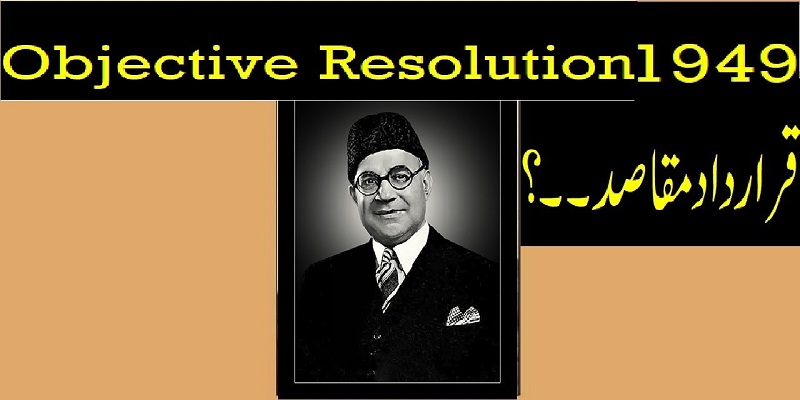Foundations of Pakistan the Objectives Resolution of 1949
The Objectives Resolution of 1949, also known as the Lahore Resolution, is a significant document in the constitutional history of Pakistan. It laid the foundation for the legal and political framework of the newly formed state, providing a guiding set of principles that would shape the country's governance and policies. In this exploration, we will delve into the background, key components, and implications of the Objectives Resolution within the context of Pakistan's history and its quest for identity.
Historical Context:
The late 1940s were a critical period for the Indian subcontinent, marked by the end of British colonial rule and the subsequent partition of British India in 1947. The partition led to the creation of two independent nations, India and Pakistan, with the latter established as a separate homeland for Muslims. Pakistan faced numerous challenges, including the task of defining its identity, formulating a constitution, and establishing a political and legal framework for the new state.
Amid these challenges, the Constituent Assembly of Pakistan, tasked with drafting the constitution, grappled with the question of the country's fundamental objectives and principles. The diverse cultural, linguistic, and religious backgrounds of Pakistan's population necessitated a unifying vision that could serve as a foundation for the country's laws and policies.
Key Components of the Objectives Resolution:
The Objectives Resolution was introduced by Prime Minister Liaquat Ali Khan on March 7, 1949, and was unanimously adopted by the Constituent Assembly on March 12, 1949. The resolution outlined the fundamental principles that would guide the constitutional and legal development of Pakistan. Key components of the Objectives Resolution include:
- Sovereignty Belongs to Allah:
The preamble of the resolution unequivocally states that sovereignty belongs to Allah alone. This declaration reflects the Islamic principle of Tawhid, asserting the absolute oneness of God and affirming that ultimate authority and power reside in Him. This provision laid the groundwork for an Islamic state where laws and governance would be aligned with Islamic principles.
- Democratic Principles:
While emphasizing the Islamic foundation, the Objectives Resolution also underscored democratic principles. It affirmed the objective of enabling the people of Pakistan to order their lives in accordance with their religious and cultural values while ensuring democratic governance. This dual commitment to Islam and democracy sought to strike a balance between religious identity and political pluralism.
- Social Justice and Economic Equality:
The resolution expressed a commitment to social justice and economic equality, aiming to eradicate social and economic disparities. This reflected the Islamic concept of social justice, as enshrined in the Quran and the teachings of Prophet Muhammad. The emphasis on economic equality aimed at creating a society that addressed the needs of the underprivileged.
- Non-Discrimination:
The Objectives Resolution advocated for the protection of the rights of minorities and marginalized groups. It affirmed that adequate provisions would be made for the protection of minorities, their rights, and their interests. This commitment was crucial for fostering inclusivity and ensuring the rights of religious and ethnic minorities in the newly formed state.
- Constitutional Framework:
The resolution served as a guiding document for the framing of the constitution of Pakistan. It highlighted the principles that would shape the constitution, and subsequent constitutional developments in Pakistan drew inspiration from the Objectives Resolution.
Implications and Criticisms:
- Islamic Identity:
The Objectives Resolution played a pivotal role in shaping Pakistan's Islamic identity. By declaring that sovereignty belongs to Allah, it laid the foundation for an Islamic state. However, the interpretation and implementation of Islamic principles in governance have been subjects of debate and contention over the years.
- Democratic Governance:
The commitment to democratic principles in the Objectives Resolution was a significant step in ensuring political pluralism. However, the subsequent history of Pakistan has seen periods of military rule and political instability, raising questions about the consistency of the commitment to democratic ideals.
- Challenges of Implementation:
While the Objectives Resolution provided a broad framework, the practical challenges of translating its principles into concrete laws and policies remained. The tension between Islamic principles and the demands of a modern, democratic state has been an ongoing challenge in Pakistan's political and legal landscape.
- Minority Rights:
While the resolution recognized the rights of minorities, the actual protection and implementation of these rights have faced challenges. Religious minorities in Pakistan have at times experienced discrimination and persecution, raising questions about the effectiveness of the provisions outlined in the Objectives Resolution.
The Objectives Resolution of 1949 is a seminal document in the constitutional history of Pakistan. It reflects the complex interplay of religious, cultural, and political forces that shaped the country's identity in its early years. The resolution's commitment to Islam, democracy, social justice, and minority rights set the stage for the development of Pakistan's legal and political framework. However, the subsequent history of Pakistan has seen both successes and challenges in the implementation of these principles, underscoring the ongoing dynamics of identity, governance, and democracy in the nation. The Objectives Resolution remains a touchstone for discussions on the foundational principles of Pakistan and the ongoing quest for a harmonious balance between Islamic values and democratic governance.

